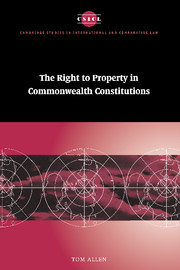Book contents
- Frontmatter
- Contents
- Table of cases
- Acknowledgements
- 1 Introduction
- 2 The right to property at common law
- 3 The development of written rights to property
- 4 Constitutional interpretation
- 5 The meaning of property
- 6 Acquisition and deprivation
- 7 Public purpose
- 8 Compensation
- Bibliography
- Index
- CAMBRIDGE STUDIES IN INTERNATIONAL AND COMPARATIVE LAW
2 - The right to property at common law
Published online by Cambridge University Press: 28 July 2009
- Frontmatter
- Contents
- Table of cases
- Acknowledgements
- 1 Introduction
- 2 The right to property at common law
- 3 The development of written rights to property
- 4 Constitutional interpretation
- 5 The meaning of property
- 6 Acquisition and deprivation
- 7 Public purpose
- 8 Compensation
- Bibliography
- Index
- CAMBRIDGE STUDIES IN INTERNATIONAL AND COMPARATIVE LAW
Summary
In most Commonwealth countries, the courts have the power to review legislation. A constitutional right to property enables the courts to declare legislation invalid in certain circumstances. In this sense, there is no constitutional right to property in countries where the courts do not have the power to review legislation, or where there is no right to property in the written constitution. In a more traditional sense, however, the idea of fundamental rights encompasses more than justiciable rights under written constitutions. In the English system, lawyers have long recognised a fundamental right to property that formed part of the constitution. Plainly, the fundamental right did not empower the courts to review legislation, but it has an important impact on state powers over property. This chapter examines the fundamental right to property partly because it is important in its own right, and partly because it provides the background to the entrenched Commonwealth rights to property. It begins by examining the unwritten right to property as an ethical limitation on Parliament, and how the unwritten right is reflected in the presumptions of statutory interpretation. It then concludes with a brief examination of the Crown's prerogative powers over property.
Parliament and property
The idea that state power was limited by fundamental law was accepted by the majority of writers in England in the Middle Ages and through to the seventeenth century.
- Type
- Chapter
- Information
- The Right to Property in Commonwealth Constitutions , pp. 13 - 35Publisher: Cambridge University PressPrint publication year: 2000



